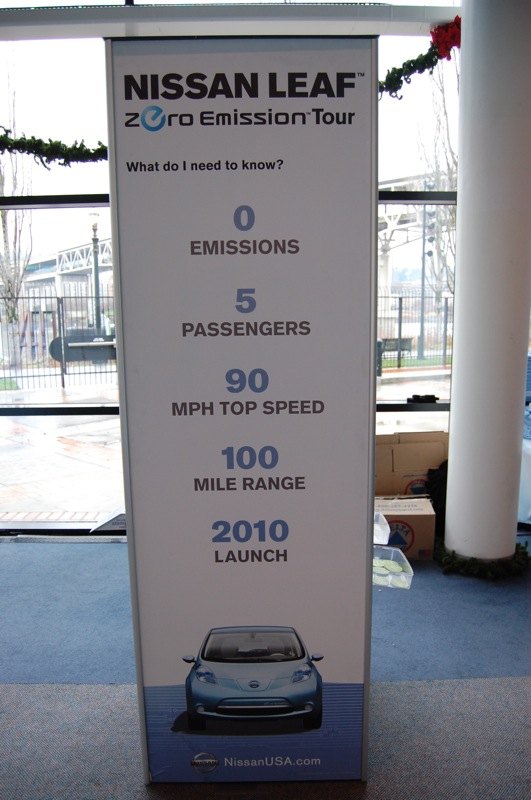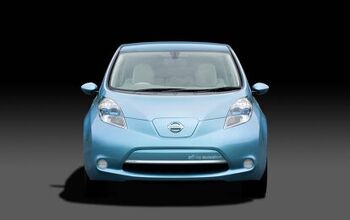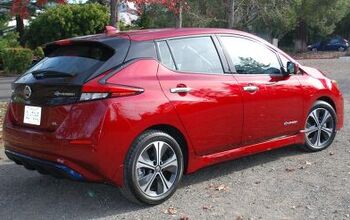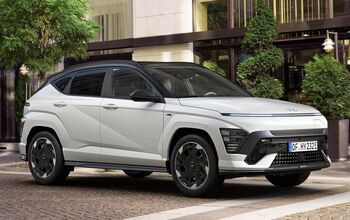How Much Will The Nissan Leaf Cost Anyway?
Nissan has had a $25k target pricetag on its forthcoming Leaf EV for some time now, as it’s built hype towards the car’s commercial rollout later this year. That price will be crucial in taking on GM’s Volt EREV, which is said to retail somewhere in the $40k ballpark but offers a range-extending gas engine. Allcarselectric.com got a little more detail out of Nissan execs, and reported back in November that
According to Brian Carolin, Nissan’s marketing executive for North America, the cost of the upcoming Leaf will be equivalent to the monthly cost of a fully loaded Honda Civic, plus the cost of its monthly fuel bill. To simplify pricing Carolin broke it down as such, “That means the purchase price (about $28,000) or comparable monthly payment for a high-end Civic plus the cost of the gasoline it would need to cover 1,200 miles (at 30 MPG and $3/gallon, about $120.”
Well maybe the words of Carolin are not easy to decipher. It appears as though he is trying to say that a Nissan Leaf will run about $120 more per month in payments if the vehicle is financed.
For example, if a fully loaded Honda Civic can be leased for $319 per month. Adding in a monthly fuel cost of $120 brings the total monthly out of pocket expense to $439. Nissan will either sell or lease the Leaf and its battery at that same price.
If that isn’t confusing enough, consider this: Nissan has just announced [via MarketWatch] that the Japanese-market Leaf will cost between 3.5m and 4m Yen ($38,661-$44,184). Of course, the US launch will coincide with US production at Nissan’s Smyrna facility, and that extra volume could help keep the price down. But will it really be $10k-$20k less than what the Japanese are being asked to pay? You’ll have to forgive us for being skeptical about that. Meanwhile, Nissan claims that 50k people have registered for ordering priority already (pre-orders begin in April), but they’re likely banking on a $25k price point. When real pricing comes out, it will be interesting to see how many of those folks actually sign up to buy the first mass-market EV on the American market.
More by Edward Niedermeyer
Latest Car Reviews
Read moreLatest Product Reviews
Read moreRecent Comments
- Alan Years ago Jack Baruth held a "competition" for a piece from the B&B on the oddest pickup story (or something like that). I think 5 people were awarded the prizes.I never received mine, something about being in Australia. If TTAC is global how do you offer prizes to those overseas or are we omitted on the sly from competing?In the end I lost significant respect for Baruth.
- Alan My view is there are good vehicles from most manufacturers that are worth looking at second hand.I can tell you I don't recommend anything from the Chrysler/Jeep/Fiat/etc gene pool. Toyotas are overly expensive second hand for what they offer, but they seem to be reliable enough.I have a friend who swears by secondhand Subarus and so far he seems to not have had too many issue.As Lou stated many utes, pickups and real SUVs (4x4) seem quite good.
- 28-Cars-Later So is there some kind of undiagnosed disease where every rando thinks their POS is actually valuable?83K miles Ok.new valve cover gasket.Eh, it happens with age. spark plugsOkay, we probably had to be kewl and put in aftermarket iridium plugs, because EVO.new catalytic converterUh, yeah that's bad at 80Kish. Auto tranny failing. From the ad: the SST fails in one of the following ways:Clutch slip has turned into; multiple codes being thrown, shifting a gear or 2 in manual mode (2-3 or 2-4), and limp mode.Codes include: P2733 P2809 P183D P1871Ok that's really bad. So between this and the cat it suggests to me someone jacked up the car real good hooning it, because EVO, and since its not a Toyota it doesn't respond well to hard abuse over time.$20,000, what? Pesos? Zimbabwe Dollars?Try $2,000 USD pal. You're fracked dude, park it in da hood and leave the keys in it.BONUS: Comment in the ad: GLWS but I highly doubt you get any action on this car what so ever at that price with the SST on its way out. That trans can be $10k + to repair.
- 28-Cars-Later Actually Honda seems to have a brilliant mid to long term strategy which I can sum up in one word: tariffs.-BEV sales wane in the US, however they will sell in Europe (and sales will probably increase in Canada depending on how their government proceeds). -The EU Politburo and Canada concluded a trade treaty in 2017, and as of 2024 99% of all tariffs have been eliminated.-Trump in 2018 threatened a 25% tariff on European imported cars in the US and such rhetoric would likely come again should there be an actual election. -By building in Canada, product can still be sold in the US tariff free though USMCA/NAFTA II but it should allow Honda tariff free access to European markets.-However if the product were built in Marysville it could end up subject to tit-for-tat tariff depending on which junta is running the US in 2025. -Profitability on BEV has already been a variable to put it mildly, but to take on a 25% tariff to all of your product effectively shuts you out of that market.
- Lou_BC Actuality a very reasonable question.


































Comments
Join the conversation
I have lived in a large urban environment for quite a while (recently moved out). I still have friends there that absolutely LOVE the idea of an electric city car since they sit in traffic so much. The problem is they have no place to plug this thing in -- they all park on the street. With an ICE car you only fear vandalism theft. With an electric card you'd have to rent a garage spot and get permission to use the electrical outlets. Common pricing is $100-$150/mo. Doesn't that eat up the advantages of not having to buy gasoline? Also: we have (in higher end/more expensive places) deeded parking spots. Is saving a few $ on gas worth shelling out $50-75k for a deeded parking spot? This spot may not even have an electrical outlet either....it just buys you parking! On top of this, it is not uncommon to have a week + with the temperature mostly below 0F (-17C). How do these batteries hold up at those temperatures? What happens when these people switch jobs & reverse commute on the highway to the suburbs for 1-2 hours & leave tons of accessories running (heater in the winter, music, lights, etc)? How does the TOTAL cost compare to: 1) public transport (Your car travelling in the same traffic as a bus isn't necessarily going to get you to your destination faster, and it will be slower than taking the train at rush hour) 2) A conventional ICE car I think there are still a lot of problems to be solved w/ electric cars, even for the "heavily urban" target market.
I'm certainly interested in an electric commuter; I'm afraid I'm going to have to replace my old Civic eventually. (By 'replace' I mean that my son will be driving in a few years and I'd rather let him use my 20 year old beater than anything nicer, which will leave me needing a way to get around). Even $28K is a bit more than I'd want to spend; I don't drive that many miles so I may have to wait for the technology to be refined and hope the price comes down sometime later. As for gas prices; all it takes is a couple of good GOM tropical storms to send us back to $4/gallon. It hasn't been THAT long since the gas lines in the South after Ike (less than 2 years) and the massive price spikes after Katrina/Rita (less than 5 years). Odds are good something will disrupt supply again soon and we'll be skirting $4/5 gas for a while before things get sorted out.